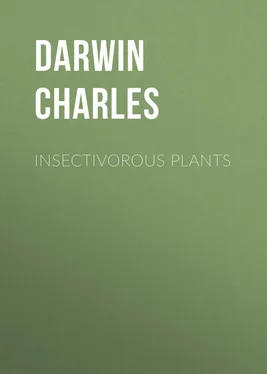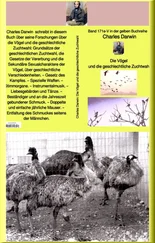Charles Darwin - Insectivorous Plants
Здесь есть возможность читать онлайн «Charles Darwin - Insectivorous Plants» — ознакомительный отрывок электронной книги совершенно бесплатно, а после прочтения отрывка купить полную версию. В некоторых случаях можно слушать аудио, скачать через торрент в формате fb2 и присутствует краткое содержание. Жанр: foreign_antique, foreign_prose, на английском языке. Описание произведения, (предисловие) а так же отзывы посетителей доступны на портале библиотеки ЛибКат.
- Название:Insectivorous Plants
- Автор:
- Жанр:
- Год:неизвестен
- ISBN:нет данных
- Рейтинг книги:5 / 5. Голосов: 1
-
Избранное:Добавить в избранное
- Отзывы:
-
Ваша оценка:
- 100
- 1
- 2
- 3
- 4
- 5
Insectivorous Plants: краткое содержание, описание и аннотация
Предлагаем к чтению аннотацию, описание, краткое содержание или предисловие (зависит от того, что написал сам автор книги «Insectivorous Plants»). Если вы не нашли необходимую информацию о книге — напишите в комментариях, мы постараемся отыскать её.
Insectivorous Plants — читать онлайн ознакомительный отрывок
Ниже представлен текст книги, разбитый по страницам. Система сохранения места последней прочитанной страницы, позволяет с удобством читать онлайн бесплатно книгу «Insectivorous Plants», без необходимости каждый раз заново искать на чём Вы остановились. Поставьте закладку, и сможете в любой момент перейти на страницу, на которой закончили чтение.
Интервал:
Закладка:
If the glands on the disc are repeatedly touched or brushed, although no object is left on them, the marginal tentacles curve inwards. So again, if drops of various fluids, for instance of saliva or of a solution of any salt of ammonia, are placed on the central glands, the same result quickly follows, sometimes in under half an hour.
The tentacles in the act of inflection sweep through a wide space; thus a marginal tentacle, extended in the same plane with the blade, moves through an angle of 180o; and I have seen the much reflected tentacles of a leaf which stood upright move through an angle of not less than 270o. The bending part is almost confined to a short space near the base; but a rather larger portion of the elongated exterior tentacles becomes slightly incurved; the distal half in all cases remaining straight. The short tentacles in the centre of the disc when directly excited, do not become inflected; but they are capable of inflection if excited by a motor impulse received from other glands at a distance. Thus, if a leaf is immersed in an infusion of raw meat, or in a weak solution of ammonia (if the solution is at all strong, the leaf is paralysed), all the exterior tentacles bend inwards (see fig. 4), excepting those near the centre, which remain upright; but these bend towards any exciting object placed on one side of the disc, as shown in fig. 5. The glands in fig. 4 may be seen to form a dark ring round the centre; and this follows from the exterior tentacles increasing in length in due proportion, as they stand nearer to the circumference.
The kind of inflection which the tentacles undergo is best shown when the gland of one of the long exterior tentacles is in any way excited; for the surrounding ones remain unaffected. In the accompanying outline (fig. 6) we see one tentacle, on which a particle of meat had been placed, thus bent towards the centre of the leaf, with two others retaining their original position. A gland may be excited by being simply touched three or four times, or by prolonged contact with organic or inorganic objects, and various fluids. I have distinctly seen, through a lens, a tentacle beginning to bend in ten seconds, after an object had been placed on its gland; and I have often seen strongly pronounced inflection in under one minute. It is surprising how minute a particle of any substance, such as a bit of thread or hair or splinter of glass, if placed in actual contact with the surface of a gland, suffices to cause the tentacle to bend. If the object, which has been carried by this movement to the centre, be not very small, or if it contains soluble nitrogenous matter, it acts on the central glands; and these transmit a motor impulse to the exterior tentacles, causing them to bend inwards.
Not only the tentacles, but the blade of the leaf often, but by no means always, becomes much incurved, when any strongly exciting substance or fluid is placed on the disc. Drops of milk and of a solution of nitrate of ammonia or soda are particularly apt to produce this effect. The blade is thus converted into a little cup. The manner in which it bends varies greatly. Sometimes the apex alone, sometimes one side, and sometimes both sides, become incurved. For instance, I placed bits of hard-boiled egg on three leaves; one had the apex bent towards the base; the second had both distal margins much incurved, so that it became almost triangular in outline, and this perhaps is the commonest case; whilst the third blade was not at all affected, though the tentacles were as closely inflected as in the two previous cases. The whole blade also generally rises or bends upwards, and thus forms a smaller angle with the footstalk than it did before. This appears at first sight a distinct kind of movement, but it results from the incurvation of that part of the margin which is attached to the footstalk, causing the blade, as a whole, to curve or move upwards.
The length of time during which the tentacles as well as the blade remain inflected over an object placed on the disc, depends on various circumstances; namely on the vigour and age of the leaf, and, according to Dr. Nitschke, on the temperature, for during cold weather when the leaves are inactive, they re-expand at an earlier period than when the weather is warm. But the nature of the object is by far the most important circumstance; I have repeatedly found that the tentacles remain clasped for a much longer average time over objects which yield soluble nitrogenous matter than over those, whether organic or inorganic, which yield no such matter. After a period varying from one to seven days, the tentacles and blade re-expand, and are then ready to act again. I have seen the same leaf inflected three successive times over insects placed on the disc; and it would probably have acted a greater number of times.
The secretion from the glands is extremely viscid, so that it can be drawn out into long threads. It appears colourless, but stains little balls of paper pale pink. An object of any kind placed on a gland always causes it, as I believe, to secrete more freely; but the mere presence of the object renders this difficult to ascertain. In some cases, however, the effect was strongly marked, as when particles of sugar were added; but the result in this case is probably due merely to exosmose. Particles of carbonate and phosphate of ammonia and of some other salts, for instance sulphate of zinc, likewise increase the secretion. Immersion in a solution of one part of chloride of gold, or of some other salts, to 437 of water, excites the glands to largely increased secretion; on the other hand, tartrate of antimony produces no such effect. Immersion in many acids (of the strength of one part to 437 of water) likewise causes a wonderful amount of secretion, so that when the leaves are lifted out, long ropes of extremely viscid fluid hang from them. Some acids, on the other hand, do not act in this manner. Increased secretion is not necessarily dependent on the inflection of the tentacle, for particles of sugar and of sulphate of zinc cause no movement.
It is a much more remarkable fact that when an object, such as a bit of meat or an insect, is placed on the disc of a leaf, as soon as the surrounding tentacles become considerably inflected, their glands pour forth an increased amount of secretion. I ascertained this by selecting leaves with equal-sized drops on the two sides, and by placing bits of meat on one side of the disc; and as soon as the tentacles on this side became much inflected, but before the glands touched the meat, the drops of secretion became larger. This was repeatedly observed, but a record was kept of only thirteen cases, in nine of which increased secretion was plainly observed; the four failures being due either to the leaves being rather torpid, or to the bits of meat being too small to cause much inflection. We must therefore conclude that the central glands, when strongly excited, transmit some influence to the glands of the circumferential tentacles, causing them to secrete more copiously.
It is a still more important fact (as we shall see more fully when we treat of the digestive power of the secretion) that when the tentacles become inflected, owing to the central glands having been stimulated mechanically, or by contact with animal matter, the secretion not only increases in quantity, but changes its nature and becomes acid; and this occurs before the glands have touched the object on the centre of the leaf. This acid is of a different nature from that contained in the tissue of the leaves. As long as the tentacles remain closely inflected, the glands continue to secrete, and the secretion is acid; so that, if neutralised by carbonate of soda, it again becomes acid after a few hours. I have observed the same leaf with the tentacles closely inflected over rather indigestible substances, such as chemically prepared casein, pouring forth acid secretion for eight successive days, and over bits of bone for ten successive days.
Читать дальшеИнтервал:
Закладка:
Похожие книги на «Insectivorous Plants»
Представляем Вашему вниманию похожие книги на «Insectivorous Plants» списком для выбора. Мы отобрали схожую по названию и смыслу литературу в надежде предоставить читателям больше вариантов отыскать новые, интересные, ещё непрочитанные произведения.
Обсуждение, отзывы о книге «Insectivorous Plants» и просто собственные мнения читателей. Оставьте ваши комментарии, напишите, что Вы думаете о произведении, его смысле или главных героях. Укажите что конкретно понравилось, а что нет, и почему Вы так считаете.












